SWEDISH SOUTH ASIAN STUDIES NETWORK
Division of Rural Development, Dept. of Urban and Rural Development; Swedish University of Agricultural Sciences (SLU), Uppsala:
Postal
address: P O Box 7012, SE-750 07 Uppsala, Sweden
Visiting address: Ulls väg 28 A–B
Web page: http://www.sol.slu.se/rural/
Contact person: Assistant Professor Seema Arora-Jonsson, Unit of Rural Development, phone: +46 (0)18 67 11 40. Personal web page.
The Division of Rural Development (LAG) is part of the Dept. of Urban and Rural Development in the Swedish University of Agricultural Science (SLU). A Department of Rural Development was initially established at SLU in the 1990s but was reconstituted into a joint department of Urban and Rural Development in 2006. LAG is located within an agricultural science/natural resource university and a key role for it is to provide a broader social understanding of the rural world to the university. The division has interests and activities relevant both to rural development in the Nordic region (a context of sparse and often declining population, harsh climatic conditions and significant natural resource based economies) and in the ‘south’ (Africa and Asia).
The educational programme of the division has been expanding. The International MSc in Rural Development and Natural Resource Management is now in its second year and has attracted participants from Europe, Asia and Africa. In addition a new programme providing a rural development stream to the 4,5 year SLU Agronomy Programme was started successfully in 2007. The doctorate programme has research students from Vietnam, Africa and Europe. Since 2004 with Swedish SIDA funding the division has been providing support to a group of Vietnamese Agricultural Universities to develop a Master programme and research capacity in Rural Development.
The research of the division is interdisciplinary and focuses on rural change processes within a comparative perspective. Four themes structure the division’s research agenda:
• Natural resources, societal sustainability and welfare outcomes
• Rural heterogeneities and diversity and welfare outcomes
• The effects of globalisation in rural areas
Relations between continuity and change
Research connected to South Asia
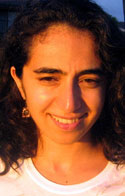 Dr. Seema
Arora Jonsson defended her doctoral dissertation on
”Unsettling the Order: Gendered subjects
and Grassroots activism in two forest communities”
on Wednesday 15 June 2005. Faculty opponent was Prof. Patricia Maguire,
Gallup Graduate Studies Centre, University of Western New Mexico,
USA.
Dr. Seema
Arora Jonsson defended her doctoral dissertation on
”Unsettling the Order: Gendered subjects
and Grassroots activism in two forest communities”
on Wednesday 15 June 2005. Faculty opponent was Prof. Patricia Maguire,
Gallup Graduate Studies Centre, University of Western New Mexico,
USA.
Abstract: The thesis investigates the changing nature of natural resource management and local development by directing attention to women’s agency in two diverse rural contexts in an increasingly connected world. Where most studies tend to study local resource management by focussing on the institutions for its management, the thesis looks for how meanings are given to local forest management and rural development in everyday life by women in the villages. The research was carried out through participatory research with the women’s forum in Sweden and that also forms the basis of a later project.
Together with the women involved, Dr. Arora Jonsson has also participated in a book project, edited by Professor Louise Fortmann at University of California, Berkeley, called ”Doing Science Together: The Politics and Practices of Participatory Research”, where the researchers from different positions reflect on their joint process and its contribution to the village community and science.
In 2005 Seema Arora Jonsson
became Project Coordinator for Uppsala University’s Collegium
for Development Studies. After that – in 2006, she also got a position
as researcher at the Centre for Gender
Research, Uppsala University.
Seema Arora Jonsson is now working on a new research project, ”Gender and Power in the Swedish Countryside: Women’s agency in development projects”, where she analyzea how policies for rural development address questions of gender, explore how gender relations shape initiatives for rural development on the ground and investigate how devolution of responsibility, the new project-based politics and attention to issues of rural development (e.g. the rural development policy 2007-2013) may provide opportunities that disrupt unequal practices. The point is to understand how gender relations shape rural development initiatives at the same time as these initiatives may be heralding new gender dynamics and identities in the countryside. The project will contribute to theorising on the gendered politics of rural development at the local level, a relatively new and unexplored field in Sweden. ![]()
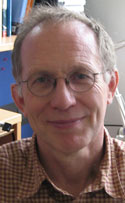 Dr. Adam
Pain has combined a career of working in theory and practice in Rural Development. A lecturer in Natural Resources in Development Studies, UK from 1976–1987, he worked in natural resource management in Africa & Asia, working in Sri Lanka 1979–81. From 1992 to 2000 he worked as principle advisor to the Minister of Agriculture in Bhutan on research and extension policy and natural resource management including running a long term EU agricultural support services. In 2001 he rejoined Development Studies, UK as a Senior Research Fellow and since then has worked extensively in Afghanistan on rural economy and change and worked with research programmes on Natural Resource management (forestry) in Nepal and India .
Dr. Adam
Pain has combined a career of working in theory and practice in Rural Development. A lecturer in Natural Resources in Development Studies, UK from 1976–1987, he worked in natural resource management in Africa & Asia, working in Sri Lanka 1979–81. From 1992 to 2000 he worked as principle advisor to the Minister of Agriculture in Bhutan on research and extension policy and natural resource management including running a long term EU agricultural support services. In 2001 he rejoined Development Studies, UK as a Senior Research Fellow and since then has worked extensively in Afghanistan on rural economy and change and worked with research programmes on Natural Resource management (forestry) in Nepal and India .
Since January 2006 he has held the position of Visiting Professor in Rural Development at SLU, Uppsala , combining postgraduate teaching, support to a Vietnam Masters in Rural Development programme and continuing to work on the opium economy, rural change and policy making practices in Afghanistan and tribal livelihoods and biodiversity management in southern India. He is the co-principle investigator of an ESRC UK funded research programme on livelihood trajectories in Afghanistan. He has published extensively on Bhutan and Afghanistan. Among other things, he was engaged by the Afghanistan
Research and Evaluation Unit (AREU) in Kabul for a study about Water
Management, Livestock and the Opium Economy in Afghanistan. In June
2006 AREU published his report about ”Opium
Poppy Cultivation in Kunduz and Balkh”, one of seven
multi-site case studies undertaken during the first stage of AREU’s
three-year study “Applied Thematic Research into Water Management,
Livestock and the Opium Economy”.
In August 2009, Dr. Pain was awarded a SASNET planning grant
for a research project entitled ”Development of a Rural Development Network between the College of Natural Resources (CNR), Royal University of Bhutan, and the Division of Rural Development, SLU, Uppsala”. More information about the 2009 SASNET planning grants.
The project was carried out in collaboration with Mr. Dorji Wangchuk, Director of the College of Natural Resources since 1999, and Dr. Jamba Gyeltshen, Senior Lecturer and Dean of student affairs at CNR. Mr. Wangchuk is a Forester by background with a Masters in Natural Resource Development from the Netherlands. He has played the key role in the institutional development of CNR and of the Royal University of Bhutan. Dr. Gyeltshen is likely to be appointed as Coordinator of the Centre for Rural Development Studies once it is established. He has a background in agricultural science, a specialism in plant protection and has worked more widely in the RNR sector in Bhutan.
Dr. Gyeltshen visited Sweden in October 2009 and discussions were held on how to proceed with tyhe project.
The project aims at providing the basis for the development of a research and teaching network between the Division of Rural Development (LAG) in the Department of Urban and Rural Development at SLU, and the College of Natural Resources (CNR) at the Royal University of Bhutan (RUB). It is envisaged that SASNET’s planning grant will support:
• The development of educational linkages for the interdisciplinary teaching of rural development and its establishment as a subject area within the CNR programme;
• The development of a research strategy for the CNR in rural development
• The submission of a joint research grant application by LAG and CNR within the general theme of Rural Change
• Support for the Development of a Centre for Rural Development Studies (CRDS) at the CNR. This was actually set up and officially opened in February 2010 by the Bhutanese Minister of Agriculture, Lyonpo Pema Gyamtsho. Adam Pain participated in this event and a research workshop that was held thereafter.
Dr. Gyeltshen is the Coordinator for the new Centre.
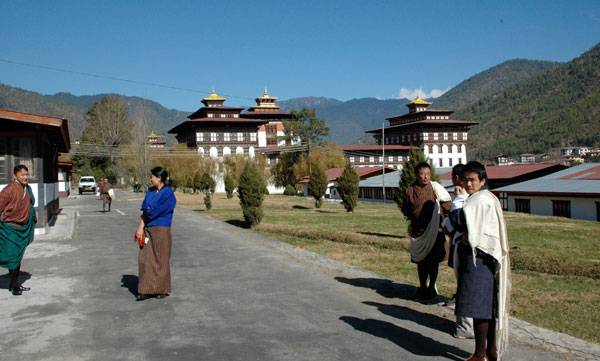 Project description: The Bhutan 10th Five year plan has as its overall objective the reduction of poverty, and most of Bhutan’s poverty is to be found in rural areas. Central to the rural development research agenda in the South Asia is poverty reduction and understanding how welfare outcomes can be improved for rural people. This links directly to the conceptual framework of welfare regimes. Fundamental to this analytical framework is the concept of the institutional landscape including not just the state but also the market, communities and households. The ideal type against which the informal security (e.g. India) and insecurity regimes (e.g. Afghanistan) are positioned is that of the welfare state regimes of the western world. Here according to their various persuasions, states, to variable degrees, protect and secure labour from market forces, and households achieve formal welfare through a mixture of market and state protection mechanisms. Implicit in this welfare state model is the separation of state from market and individuals, the existence of boundaries, rules, rights and obligations which establish degrees of order, fairness and predictability. The welfare state is what largely characterises Sweden.
Project description: The Bhutan 10th Five year plan has as its overall objective the reduction of poverty, and most of Bhutan’s poverty is to be found in rural areas. Central to the rural development research agenda in the South Asia is poverty reduction and understanding how welfare outcomes can be improved for rural people. This links directly to the conceptual framework of welfare regimes. Fundamental to this analytical framework is the concept of the institutional landscape including not just the state but also the market, communities and households. The ideal type against which the informal security (e.g. India) and insecurity regimes (e.g. Afghanistan) are positioned is that of the welfare state regimes of the western world. Here according to their various persuasions, states, to variable degrees, protect and secure labour from market forces, and households achieve formal welfare through a mixture of market and state protection mechanisms. Implicit in this welfare state model is the separation of state from market and individuals, the existence of boundaries, rules, rights and obligations which establish degrees of order, fairness and predictability. The welfare state is what largely characterises Sweden.
Bhutan is also a welfare state, in that over the last 25 years or more it has invested over 25% of its government budget in health and education leading to a transformation of its people’s welfare although some 20% or more remain below the poverty line. Linked to this it has also been a developmental state which by virtue of a leadership vision, an impartial and competent bureaucracy and a nation-wide public that has bound people to the state building project, has transformed the welfare outcomes of its people over a remarkably short time. It has not followed the western orthodox model of state building or poverty reduction and has pursued its own organic processes of democratic development culminating in its first nationally elected government and the establishment of a constitutional monarchy in 2008. There are wider lessons to be learnt from the processes of state building in Bhutan and the transformation of rural livelihoods in a context of a strong commitment to sustainable environmental management.
This is not to ignore the major issues of rural poverty that remain. While access to public goods (roads, education and health) has transformed rural outcomes, Bhutan’s mountain economy (with dimensions of remoteness, inaccessibility, fragility etc in a context of climatic change) and its rich cultural landscape provides constraints, challenges and opportunities. There is indicative evidence of rural labour scarcity combined with increasing rural urban migration reflecting a key constraint of agricultural profitability, emerging social and economic differentiation including landlessness, the ageing of rural populations and feminisation of agriculture and so forth within a context of a small domestic economy. Understanding processes of rural change therefore and the impact of government policy and democratic changes on these shifts sets a challenging agenda for the proposed Centre for Rural Development Studies and provides the rationale for developing a collaborative research programme between the two partners. Such research would link directly to LAG’s engagement with comparative research and its research themes.
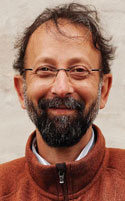 Dr. Ian
Christoplos is a part-time non-resident researcher at the Divison of Rural Development. His work with the department primarily consists of contributions to the department’s education programme in Vietnam, but he has also worked on extension service provision,
dealing with agricultural rehabilitation and rural development in countries
experiencing chronic conflict.
He is a Research Associate of the Overseas Development Institute (ODI)
in London. Mostly working in Macedonia on agricultural service issues,
still he has also worked in Afghanistan, Nicaragua, Angola, Lesotho, the
Horn of Africa and Southeast Asia.
Dr. Ian
Christoplos is a part-time non-resident researcher at the Divison of Rural Development. His work with the department primarily consists of contributions to the department’s education programme in Vietnam, but he has also worked on extension service provision,
dealing with agricultural rehabilitation and rural development in countries
experiencing chronic conflict.
He is a Research Associate of the Overseas Development Institute (ODI)
in London. Mostly working in Macedonia on agricultural service issues,
still he has also worked in Afghanistan, Nicaragua, Angola, Lesotho, the
Horn of Africa and Southeast Asia.
In recent years he has completed issues papers on agriculture and livelihoods,
commissioned by the Afghanistan Research
and Evaluation Unit, AREU. Later on he has also been highly involved
in the evaluation of AREU. During 2005 he was involved in assorted International
tsunami related activities, including being team leader of the evaluation
of the United Nations International Strategy for Disaster Reduction. He was involved in an international
review of the progress that has been made in linking relief, rehabilitation
and development in the response to the Indian Ocean Tsunami. Dr.
Christoplos currently lives in Glemmingebro, near to Ystad in southern
Sweden.
Since August 2009, Dr. Christoplos is also working as a part-time Senior Project Researcher for the Danish Institute for International Studies (DIIS) in Copenhagen. His role there is to analyze issues related to the role of local institutions in relation to poverty and natural resource management, with particular focus on climate change.
He is also, since 2008, a member of the Swedish Commission on Climate Change and Development, initiated by the Swedish Ministry of Foreign Affairs.
More information on Dr. Christoplos and his research.
Educational courses related to South Asia
A multidisciplinary PhD course on ”Gender, Rural Development and Natural Resource Management” was held in Uppsala 28 April – 16 May 2008. The 4,5 ECTS credits course was provided by the Unit for Rural Development, and focused on the role that gender equality and democracy have in the attainment of sustainable development. What pressures do violent conflicts and epidemics put on resource use and how does that impact on gender relations? What insights do we gain from feminist postcolonial readings of development and natural resource management? The teachers included Seema Arora-Jonsson and Adam Pain. Dr. Nitya Rao from the University of East Anglia, UK, also took part in the course, and taught about ”Land and gender: Key debates”. More information.
2008 Uppsala research conference on “Nature, Knowledge, Power”
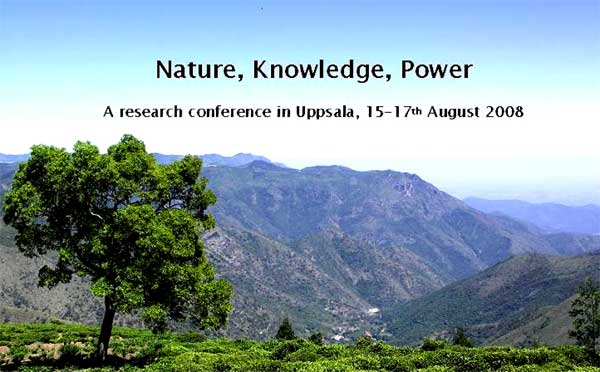 An international research conference entitled “Nature, Knowledge, Power” was held in Uppsala 15-17 August 2008. It was hosted by the Dept. of Urban and Rural Development, but chaired by Gunnel Cederlöf, Dept. of History.
An international research conference entitled “Nature, Knowledge, Power” was held in Uppsala 15-17 August 2008. It was hosted by the Dept. of Urban and Rural Development, but chaired by Gunnel Cederlöf, Dept. of History.
Prof. Adam Pain was a member of the organising committee.
SASNET was the main funder and organiser, whereas FORMAS and DevNet at the Centre for Sustainable Development, Uppsala University contributed with grants. The conference administrator was Henrik Chetan Aspengren.
The conference brought together researchers from different academic fields, concerned with questions of environment and society under present and historical conditions.
About forty researchers and research students equally from South Asian and European universities participated in the conference and 25 full research papers were presented papers within five panels: “Energy: renewable and sustainable?”, “Competing rights, codifying law”, “Community rights under neoliberal rule”, “Who needs conservation? Nature, people, survival”, and “Ideologies of environmental change: from imperial modernization to postcolonial social equality?”.
The keynote speakers were Dr. Amita Baviskar from the Institute of Economic Growth at Delhi University, India and Prof. Arun Agrawal, University of Michigan. At the conference, an inter-disciplinary network of researchers focusing on South Asian environmental issues began to emerge. More information about the Uppsala conference.
SASNET - Swedish South Asian Studies Network/Lund
University
Address: Scheelevägen 15 D, SE-223 70 Lund, Sweden
Phone: +46 46 222 73 40
Webmaster: Lars Eklund
Last updated
2011-05-02
